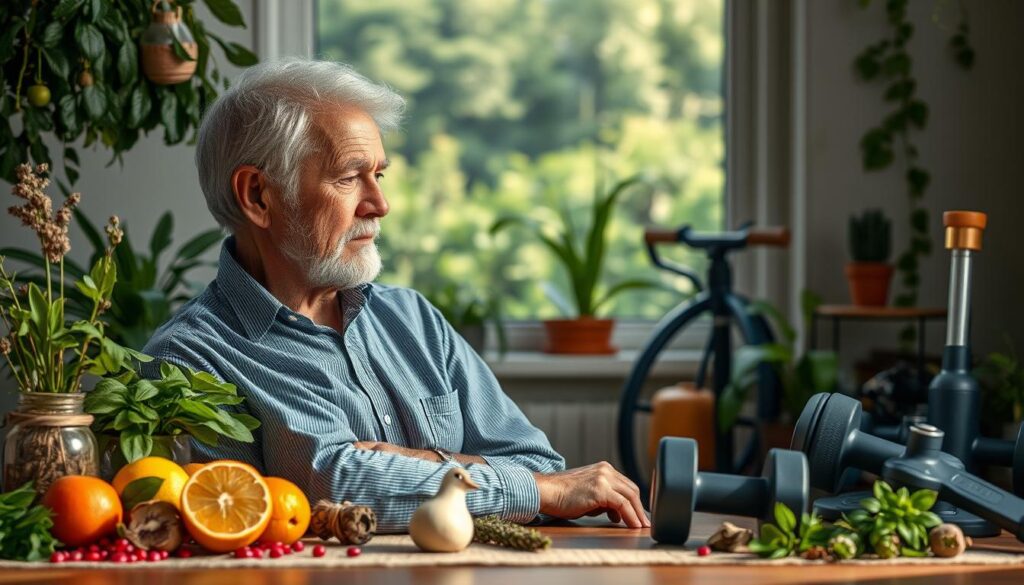Men over 65 often see big changes in their libido. These changes can be tough to deal with. Hormonal shifts, health issues, and mental factors all play a part.
It’s important to remember that everyone is different. Libido isn’t just about biology. It’s also about feelings and relationships. Talking openly about these changes can really help.
Understanding Male Libido Changes
Libido is the desire for sexual activity. It’s key in male sexual health, affecting relationships and well-being. As men get older, libido changes are common, due to both physical and mental factors.
Hormonal shifts, like lower testosterone, and mental health issues, like stress, play a role. These factors can change how much sex drive a man has.
Things like diet, exercise, and relationships also affect libido. For example, staying active can help keep sexual desire high. Being emotionally close to a partner also boosts libido, especially as men age.
Libido changes aren’t just about getting older. They can be influenced by many things. Many men find help by talking to professionals. They might suggest counseling or making lifestyle changes to improve libido. For more information, check out this resource.

What is the Male Libido After 65?
The male libido after 65 is complex. Many men see changes in their sexual desire as they age. Yet, research shows that a lot of men still have a good libido.
Studies show that a big number of older men are still sexually active. About 50% of men between 65 and 74 are active. Health, mental well-being, and relationships affect their libido.

Emotional connection and physical health are key to libido. Some men find they want sex more, while others want it less. Understanding these factors helps clear up myths about aging and sex.
Factors Affecting Male Libido in Older Age
Understanding libido in older men involves looking at hormones, mental health, and physical health. Each plays a big role in sexual desire and performance as men get older.
Hormonal Changes
As men age, their hormones change, especially testosterone levels drop. This can lower libido and make it hard to stay aroused. Changes in other hormones also affect sexual desire, so it’s key to watch these changes.
Mental Health Impacts
Mental health greatly affects libido in men over 65. Stress, depression, and anxiety can reduce sexual desire and overall well-being. It’s important to tackle mental health to boost libido and improve quality of life.
Physical Health Conditions
Many health issues come with aging, affecting libido. Diabetes and heart disease, common in older men, can cause erectile dysfunction and lower sexual desire. Keeping physical health in check is essential for better sexual function and libido.

Common Myths About Male Libido After 65
Many people believe that older men lose all interest in sex. But this isn’t true for everyone. Some men keep their libido strong, thanks to good health and strong relationships.
Another myth is that sex becomes less important with age. But intimacy and connection are just as vital for older men. Many share stories of enjoying healthy sex lives well into their 60s.

- Myth: Older men have no interest in sex.
- Fact: Many men continue to engage in satisfying sexual experiences.
- Myth: Sexual performance cannot improve after 65.
- Fact: Health improvements and relationship focus can enhance libido.
It’s important to clear up these myths about libido. Talking openly about these topics helps men stay confident and happy. It’s all about keeping the conversation going.
Signs of Low Libido in Older Men
It’s important to know the signs of low libido in older men early. These signs can be physical or emotional. Understanding them can help in talking about health and relationships.
Physical Symptoms
Physical signs of low libido are often clear. Common signs include:
- Decreased sexual desire
- Difficulty achieving or maintaining an erection
- Changes in sexual performance
These symptoms can make a man feel less confident. It’s key to notice these signs, as they might show health issues.
Emotional Indicators
Emotional signs can also show low libido. Feeling disconnected or uninterested in sex is common. These feelings often relate to mental health. It’s vital to address these emotional signs for overall well-being.
Treatment Options for Low Libido in Men Over 65
Men over 65 with low libido have many treatment options. A mix of lifestyle changes and medical help can boost libido. A well-rounded approach often works best.
Lifestyle Changes
Positive lifestyle changes can greatly improve libido. Here are some tips:
- Improved Diet: Eating a balanced diet with fruits, veggies, whole grains, and lean proteins helps.
- Increased Physical Activity: Regular exercise boosts energy and mood, leading to higher libido.
- Reduced Alcohol Consumption: Drinking less alcohol can improve sexual health.
- Stress Management: Stress-reducing activities like meditation, yoga, or spending time with loved ones help.
Medical Treatments
Medical treatments are also available for those who need more help. Options include:
- Prescription Medications: Some meds can balance hormones.
- Hormone Replacement Therapy: This therapy can increase testosterone, boosting libido.
- Other Medical Interventions: Talk to a healthcare provider for specific advice.
Over 65 Male Anti-Libido Pill: What You Need to Know
For men over 65, understanding how medications affect libido is key. Some drugs help with health issues but can lower sex drive. Knowing about over 65 male anti-libido pill effects is vital for keeping sexual health in check.
Some common medicines that might lower libido include:
- Antidepressants, especially SSRIs.
- Beta-blockers for heart problems.
- Hormonal treatments that can affect testosterone.
There might be other options that help with health and libido. Always talk to your doctor before changing your meds. They can help find the right balance for your health and sex life. They might suggest looking at current medications and finding better alternatives.
Nutrition and Male Libido: Dietary Considerations
Nutrition is key to keeping male libido strong. Eating a balanced diet with the right nutrients can boost sexual health. Knowing how nutrition for libido and food choices affect sexual vitality is crucial for older men.
Foods that Boost Libido
Some foods that enhance libido are especially good. Adding these to your diet can help balance hormones and improve overall health. Here are some foods to try:
- Avocados: They’re full of healthy fats and vitamins, which can improve blood flow and energy.
- Nuts: Almonds, walnuts, and pistachios have omega-3 fatty acids that may boost libido.
- Lean Proteins: Chicken, turkey, and fish provide amino acids that support hormone production.
- Dark Chocolate: It has flavonoids that can increase circulation and arousal.
The Role of Vitamins and Supplements
Vitamins and supplements can also help with male libido. Vitamins D and E help regulate hormones and may improve sexual health. Supplements like zinc and L-arginine can boost libido by improving blood flow and energy. Adding these to your diet can have a positive effect.
Exercise and Its Effect on Libido
Regular exercise can greatly boost male libido, improving both physical and emotional health. It shows how exercise benefits overall health, boosting energy and mood. Men over 65 may see better sexual health by adding exercise to their routine.
Cardiovascular workouts, like walking, swimming, or cycling, are great. They improve blood flow, key for arousal and performance. Better blood flow helps with sexual function and stamina.
Strength training is also effective. It raises testosterone, a hormone linked to libido. More strength and muscle tone can also boost confidence, helping in intimate relationships.
Lastly, flexibility exercises like yoga or stretching reduce stress. Lower stress means a higher libido, making intimacy easier. Enjoyable physical activities can make exercise a rewarding daily part.
Psychological Factors and Their Influence on Libido
The connection between psychological factors and libido is key, especially for older men. Self-esteem and body image greatly affect sexual desire. Low self-esteem can lower libido, creating a cycle that hurts confidence even more.
Being happy in a relationship is crucial for a healthy sex life. A good relationship boosts intimacy. But, conflicts or poor communication can make sex less interesting. This shows how mental health and sex health are closely linked.
Mental health problems like depression and anxiety can really hurt sexual desire. It’s important to tackle these issues to boost libido. Therapy or counseling can help improve mental health, which can also help with sex drive. Understanding the psychological side of libido is key to a fulfilling sex life later in life.
Societal Stigma Around Aging and Sexual Health
Many older adults face a stigma because of how society views aging. People often think that sex is less important as you get older. This can make seniors feel left out and alone.
It’s common for older men to feel like they’re not supposed to have a healthy sex life. This makes it hard for them to talk about their needs and wants.
We need to work together to change these wrong ideas. We should have honest talks to challenge these stereotypes. Many don’t know how age affects sex and feelings.
Being aware of these issues is key. Awareness campaigns can help reduce stigma and make aging better.
Studies show that society’s expectations and biases affect older adults’ sex lives. A review found that breaking down barriers is crucial. Talking about societal views on aging helps seniors feel okay about their sexuality.
In the end, by tackling this stigma, we can make a place where everyone’s sexual rights are respected, no matter their age.
Maintaining Intimacy in Relationships After 65
Maintaining intimacy after 65 needs effort and understanding. Changes in libido can make things tough. It’s key to talk openly and honestly to keep emotional bonds strong.
Communicating with Partners
Talking openly is crucial for keeping intimacy alive. Sharing needs and desires creates a safe space. This helps couples face changes together.
- Identify areas of concern or misunderstanding.
- Enhance emotional intimacy through vulnerability.
- Reinforce trust and connection by ensuring both partners feel valued.
Being open about thoughts can ease worries about sex. It helps build deeper connections.
Exploring New Intimacy
Intimacy after 65 isn’t just about sex. There are many ways to be close and affectionate. Some ideas include:
- Engaging in regular physical touch, such as hugging or cuddling.
- Participating in activities that foster connection, like dancing or cooking together.
- Creating rituals that include shared time, like watching a movie or enjoying nature walks.
Trying new things can strengthen emotional bonds. It makes the relationship feel more like a partnership, beyond just physical closeness.
When to Seek Help for Low Libido in Older Men
Knowing when to seek help for low libido is key for staying healthy and happy. Signs you might need professional assistance include:
- Prolonged periods of low libido that last weeks or months.
- Feeling stressed or anxious about changes in sexual desire.
- Changes in libido affecting your relationships or intimacy.
- Feeling depressed or anxious, especially if it’s linked to low libido.
If you’re facing these issues, it’s time to get help. Talking to a healthcare provider can offer valuable advice. It can help improve your health and confidence.
Resources for Understanding Male Sexual Health
Having access to good male sexual health resources is key to understanding and managing sexual wellness. Older men and their partners can find many helpful resources. These can improve their knowledge and support.
- Books: There are many books that give insights into male sexual health. They focus on older men’s issues. Look for books written by reputable authors and healthcare experts.
- Support Groups: Joining a support group is a great way to share experiences and learn. Many groups focus on men’s health. They create a space for open discussions.
- Websites: Websites like the Mayo Clinic and American Urological Association are great resources. They have sections on sexual health for older men. These sites are trusted and reliable.
- Healthcare Practitioners: Doctors who specialize in geriatric health are very helpful. They can offer valuable advice. Look for doctors who focus on sexual wellness.
Education and talking about male sexual health can help break down barriers. Knowing more can encourage men to seek help. This can greatly improve their well-being.
Common Questions About Male Libido After 65
As men get older, they often wonder about their libido. They ask if it’s normal for their sexual drive to change. They also want to know how these changes might affect their overall health.
Many older men seek answers to these questions. They want to know if their experiences are typical. Understanding these changes can help ease worries about aging and sex.
For those looking into male sexual health, knowing about normal libido levels is key. Hormonal changes, physical health, and emotional well-being can all affect sexual desire. It’s important for older men to find answers to these questions to keep their intimate life fulfilling.
Being proactive about sexual health can improve quality of life. It’s vital to use resources for education and support. Knowing about libido after 65 can help men make choices that enhance their sex life. It can also help them build deeper connections and feel confident about their sexual health.






